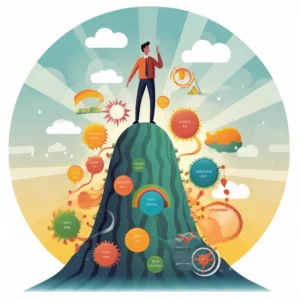Today, we’re diving into a concept that might just change how you see yourself and others- self-efficacy. Whether you’ve heard about it before and are confused about what it is and how it works, or this is your first time coming across the concept, don’t worry; we’ve got you covered. In the complex realm of human psychology, self-efficacy stands as a powerful concept that has the ability to change lives.
Don’t let the fancy term scare you off; we’re here to unravel its secrets in the most straightforward way possible. Think of self-efficacy as the superhero cape you wear inside your mind – the belief that you can tackle challenges, slay goals, and emerge victorious. This belief in one’s ability to accomplish tasks and overcome challenges plays a pivotal role in shaping our behaviors, choices, and, like some might say, our destinies.
In this adventure, we’re not just scratching the surface; we’re diving deep into 12 stellar self-efficacy examples that might just redefine how you perceive your own capabilities. So, fasten your seatbelts; we’re about to take a deep dive! Are you ready?
Table of Contents
ToggleWhat is Self-Efficacy
Now, before we plunge into the examples, let’s get cozy with the concept of self-efficacy. Imagine it as your internal cheerleader, the voice in your head saying, “You’ve got this!” Coined by the legendary psychologist Albert Bandura, self-efficacy revolves around the belief in your ability to conquer tasks and achieve your goals. It’s more than just confidence; it’s a deep-rooted conviction that you can make things happen. Now, let’s set sail into the vast sea of self-efficacy examples.

Best Self-Efficacy Examples
We’re about to explore a curated collection of examples that showcase self-efficacy in its various forms. But wait, we’re not jumping straight into self-efficacy examples. First, let’s categorize this self-efficacy fiesta into two distinct parties: the high-fivers and the low-key doubters. These contrasting states shape our approach to goals, influence our response to setbacks, and mold the narrative of our personal and professional lives.
Distinguishing High Self-Efficacy & Low Self-Efficacy
High self-efficacy is the superhero mentality – it’s the belief that you can face challenges head-on, learn new things with gusto, and bounce back from setbacks like a champ. On the flip side, low self-efficacy is the sneaky doubt that whispers, “Can I really do this?” It makes you avoid things because you’re afraid of setbacks. Now, let’s zoom into both sides of the self-efficacy spectrum with some real-world examples that will make these concepts crystal clear.

High Self-Efficacy Examples
Having a Growth Mindset
Picture this: you encounter challenges and instead of shying away, you see them as growth opportunities – like leveling up in a video game. That’s a growth mindset, a prime example of high self-efficacy. Individuals with a growth mindset view challenges as stepping stones to improvement and success. They’re not afraid when they’re faced with problems and like facing things head-on.

Setting and Achieving Personal Goals
Now, think about someone setting goals and not just achieving them but smashing them. High self-efficacy champs don’t just dream; they make things happen. Be it fitness goals, career milestones, or personal achievements, they set the bar high and clear it with style. Can you imagine making New Year’s resolutions and actually following them? People with high self-efficacy can! Setting ambitious goals and confidently achieving them showcases high self-efficacy, and that’s why this is one of the prime self-efficacy examples.
Also read: 10 Benefits of Speed Reading
Public Speaking Confidence
Public speaking is a universal fear and can be a daunting experience, but not for high self-efficacy champs. They own the stage, confidently delivering speeches like it’s a piece of cake. The fear of judgment? Non-existent. They trust their ability to articulate ideas and connect with their audience by captivating them with their words. Want to know more? Let’s look at some more high self-efficacy examples for better clarity.

Taking Initiative in Leadership Roles
Ever witnessed someone taking the lead, making decisions, and handling challenges effortlessly? It’s almost like they were born with it. That’s high self-efficacy at work, turning leaders into bosses. They trust their judgment, dive into the deep end without fear, and inspire others with their confidence.
Overcoming Procrastination
What’s Procrastination? It’s not in the vocabulary of high self-efficacy legends. They tackle tasks head-on, believing they’ve got what it takes to overcome any hurdle. The to-do list is not a burden but a checklist for success; they approach it with determination.

Adopting a Healthy Lifestyle
Healthy habits aren’t a chore but a lifestyle for high self-efficacy champs. They trust themselves to make smart choices, from nutritious meals to regular workouts. It’s not about restrictions; it’s about well-being, and they embrace it with confidence.
Do you want to improve your self-efficacy? Do you want to stand out from the crowd? Do you want to be the smartest man in the room with the best memory?
Check out Guinness World Record holder for Memory and 2X USA Memory Champion’s personally curated program Farrow Memory now!!!
Low Self-Efficacy Examples
Experiencing Self-Doubt
Now, let’s flip the script. Imagine experiencing self-doubt – that nagging feeling that maybe you can’t pull something off. Low self-efficacy creeps in, making you question yourself even before you begin. The internal dialogue is filled with uncertainty and hesitancy. It’s not you but your low self-efficacy at work.

Avoidance of Challenges
Challenges? Nah, let’s pass. Low self-efficacy people avoid challenges like a cat avoids water. Fear of failure holds them back, and stepping out of their comfort zone feels like a daring mission. They prefer the safety of the familiar over the uncertainty of the unknown. They would rather stay where they are instead of taking a mysterious road to success.
Negative Impact on Mental Health
Low self-efficacy isn’t just a buzzkill; it’s a stress magnet. It cranks up the anxiety, making everyday hurdles feel like mountains. The belief in one’s inability to cope with life’s challenges takes a toll on mental well-being. Every setback feels like a confirmation of their perceived incompetence, leading to heightened stress levels.

Reluctance to Pursue Ambitious Goals
Dreaming big? Not for low self-efficacy folks. Ambitious goals seem daunting, and that fear of falling short keeps them playing small. The big dreams are locked away in the “maybe someday” drawer, as they hesitate to take bold steps. Their ability to envision and pursue grand objectives is paralyzed by their fear of falling short due to their low self-efficacy.
Feeling stuck in your career? Have you been waiting for a promotion for ages? Are you looking for the perfect skill to set you apart?.
Check Out Dave Farrow’s Farrow Memory Course Which Teaches You Lifelong Skills That Will Leave People Speechless!
Dependency on External Validation
Low self-efficacy individuals rely on others for a confidence boost, often seeking constant external validation. Their self-worth hinges on external approval, making every decision a quest for reassurance. They find it challenging to trust their judgment without seeking validation from others.
Resignation in the Face of Failure
Failure hits differently when low self-efficacy is in the picture. Instead of seeing it as a lesson, it’s more like a confirmation that they’re not up to it. Unfortunately, every stumble shows their inability to succeed, leading to a sense of resignation.

The Science Behind Self-Efficacy
Understanding the intricacies of self-efficacy involves diving deep into the realms of psychological theories and research studies. Research studies in the field of psychology have explored the correlation between self-efficacy and various aspects of human behavior. These studies involve assessing how individuals with high self-efficacy approach challenges, make decisions, and persevere in the face of setbacks.
Also read: How To Remember What You Read – 15 Simple Methods
How Self-Efficacy Affects the Brain and Decision-Making
The impact of self-efficacy extends beyond mere confidence; it influences the brain’s cognitive processes and decision-making. Neuroscientific studies reveal that individuals with high self-efficacy exhibit enhanced neural activity in areas associated with motivation and goal-directed behavior.
Moreover, self-efficacy influences the release of neurotransmitters such as dopamine, contributing to a sense of reward and accomplishment. Understanding these neurological aspects provides insights into how fostering self-efficacy can positively shape decision-making processes.

Self-Efficacy in Different Life Stages
Self-efficacy is a dynamic companion throughout the various stages of life, influencing thoughts, actions, and resilience. In childhood, the development of self-efficacy is closely linked to the mastery of basic skills. As children overcome challenges and acquire new abilities, their belief in their competence grows.
During your adolescence, self-efficacy plays a pivotal role in navigating the complexities of identity formation and peer relationships. High self-efficacy can empower teenagers to pursue ambitious goals and handle the inevitable uncertainties of this transitional phase.
In adulthood, self-efficacy influences career choices, job performance, and the ability to cope with life’s challenges. Successful entrepreneurs and leaders often attribute their achievements to a robust sense of self-efficacy, enabling them to take risks and persist in the face of adversity.

Later in life, self-efficacy becomes a crucial factor in adapting to changes associated with aging. Individuals with high self-efficacy are more likely to embrace new experiences, maintain a positive outlook, and effectively cope with the physical and emotional aspects of aging.
Self-Efficacy in the Workplace
The workplace becomes a canvas where self-efficacy paints a vivid picture of job performance, career development, and leadership. Individuals with high self-efficacy are more likely to set challenging goals, persist in the face of setbacks, and exhibit resilience in the ever-evolving professional landscape.
Examining successful entrepreneurs and leaders often unveils a strong undercurrent of self-efficacy in their stories. These individuals believe in their capacity to influence outcomes, make impactful decisions, and lead teams with confidence. Their journeys represent the profound impact that self-efficacy can have on shaping successful careers.
Also read: 17 Best Books That Make You Smarter
Techniques to Boost Self-Efficacy
If you want to be empowered to enhance your self-efficacy, you will need to follow the following practical tips and exercises that bridge theory and action. These are some actionable steps toward cultivating a robust sense of self-efficacy.
Mindfulness practices, such as meditation and self-reflection, can cultivate self-awareness and boost confidence. When approached with realistic expectations and incremental steps, goal-setting becomes a powerful tool for building and sustaining self-efficacy.

Positive affirmations serve as a daily dose of self-belief, reshaping internal narratives and fostering a more positive self-image. You need to embrace challenges as opportunities for growth, celebrate your achievements, and actively seek new learning experiences.
To Wrap it Up
Phew! That was a rollercoaster of self-belief, from the highs of confidence to the lows of doubt. Now, why does it matter, you ask? Because this mindset is the GPS for our journey. Understanding this self-efficacy game opens doors to growth and intentional living, whether you’re a high-fiver or a low-key doubter.
So, as we wrap up this self-efficacy adventure with self-efficacy examples, remember this: your belief in yourself is like the fuel for your success rocket. Let it guide you, push you, and be the hype squad cheering you on. Here’s to a future where believing in yourself becomes the launchpad for your most incredible feats. You got this!


